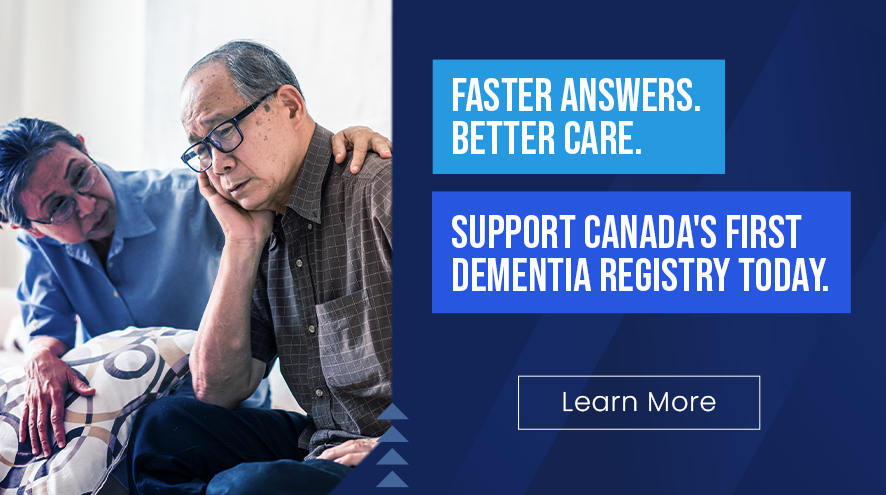Preparing for the future of dementia care in Ontario
Our cognitive assessment and dementia registry projects support earlier detection, faster support, and a better future for people living with dementia and their care partners.

Timely access to diagnosis and treatment is one of the most critical challenges facing people living with dementia in Ontario. As new disease-modifying therapies (DMTs) for Alzheimer’s disease become available, our province must be ready. That’s why the Alzheimer Society of Ontario (ASO), in partnership with the Ontario Brain Institute (OBI), is combining accessible cognitive assessments with the creation of Canada’s first dementia registry.
These initiatives are not only about access to new therapies. They’re about reducing wait times, closing systemic gaps, and ensuring everyone, including those from marginalized or rural communities, can receive a timely diagnosis and the support they need to live well with dementia.
Why is this work important?
Every 3 minutes, someone in Canada is diagnosed with dementia. That’s more than 10,000 new diagnoses each month, and that number is only rising. Ontario’s current healthcare system can’t keep up.
Families are often left waiting nine months or more just to access a cognitive assessment—an essential first step, not a diagnosis. The actual diagnosis can take even longer, sometimes stretching into years or, in some cases, never being reached at all.
Local cognitive assessments in communities across Ontario, in tandem with the dementia registry, will change that. With DMTs like lecanemab and donanemab on the horizon, the need for system readiness is more urgent than ever. Without a functioning registry and equitable access to screening, many Ontarians risk being left behind.
With your support, people living with dementia can get help faster, plan earlier, and access the care they deserve.
Support the future of dementia care. Donate today.
Blood Based Biomarkers
To learn more, click here.
Cognitive assessments: meeting people where they are at
Through this initiative, local Alzheimer Societies in Ontario are delivering free, community-based cognitive assessments using tools like the Montreal Cognitive Assessment (MoCA). These assessments are being piloted in four regions: Sudbury, Sault Ste. Marie & Algoma, and Durham Region. Wait times in these areas previously stretched beyond nine months. With new staffing, infrastructure, and workflows, the project is helping clear those backlogs and connect people to care sooner.
Why are cognitive assessments important?
Early detection makes a difference. It enables people to access support services earlier, make future care plans, and, quite critically, qualify for emerging treatments that are most effective in the early stages of the disease.
How does it work?
- People with memory concerns receive a standardized cognitive screening.
- Trained staff provide follow-ups and referrals.
- With informed consent, anonymized data is entered into the dementia registry.
The dementia registry: a national first
The dementia registry is a secure, ethically governed data platform developed using OBI’s Brain-CODE infrastructure. It collects anonymous, real-world evidence about people living with dementia, including:
- Demographics
- Cognitive scores
- Health outcomes over time
Why does this matter?
Real-world evidence is essential for getting new dementia drugs approved and reimbursed in Canada. A dementia registry helps policymakers, health systems, and researcher
- Track gaps in care
- Evaluate interventions
- Make smarter, more equitable decisions
- Improve access to DMT’s
Who's Involved?
An expert advisory group guides the project, and the registry is being designed for scalability across Ontario. Long-term, the goal is to integrate registry contributions from a range of care providers, including geriatricians, memory clinics, and primary care teams, not just Alzheimer Societies.
Equity at the forefront
People from marginalized communities, such as Indigenous peoples, 2SLGBTQ+ individuals, newcomers, and those in rural areas, face greater barriers to diagnosis and care. This project is guided by equity, inclusion, and accessibility. Outreach and culturally responsive engagement strategies are being used to ensure the registry and assessments reflect Ontario’s diverse population.
Impact to date
- Registry platform launched using REDCap infrastructure
- Ethics-approved community-based assessments underway
- Over 1,500 individuals targeted for screening
- Partnerships formed with three pilot regions
- International recognition for registry model (ICIC 2025, CCNA Hot Topics)
- Active engagement with policymakers and government funders
Help build a dementia-ready Ontario
This is more than a pilot project. It’s the start of system-wide transformation. With your support, we can scale this model across the province, shorten diagnostic waitlists, and prepare Ontario to deliver tomorrow’s treatments, today.
